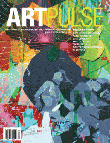« Reviews
Mircea Cantor - Tracking Happiness
Mircea Cantor. Tracking Happiness, 2009, Productions still, © Mircea Cantor, Courtesy Kunsthaus Zürich
Kunsthaus Zurich, in collaboration with Museum Abteiberg, Mönchenbladbach
By Michele Robecchi
Mircea Cantor has, more than once, proven to be a versatile artist. Concrete sculptures, drawings, artist publications, web projects, installations, videos, paintings, sound pieces, ready-made objects, site-specific interventions - there are many ways to make art and Cantor is fully conversant with all of them. But it is when he is on film that he is at his best. His moving images follow a precise if not simple pattern, with one single scenario and constant movement slowly building a narrative. At times the story follows a circular path, at other times there is a crescendo towards a grand finale, but both solutions never fail to create a climax of such colossal proportions that it puts even the most detached of viewers into a deeply reflective mood. Cantor’s work is like a book of Buddhist aphorisms - you read it in two hours and mull over it for two months.
“Tracking Happiness,” the exhibition co-organized by Mirjam Varadinis and Susanne Titz, presents a substantial selection of Cantor’s most recent production mixed with brand new works. Like Birds on a High-Voltage Wire (2009) is a frame laced with a selection of wooden and silver spoons hanging from steel wires. At first sight, it feels like an elegant sculpture blessed by a remote Arte Povera flavor, but the inanimate kitchen utensils are a lot more sinister after an attentive look. They remind us of the dangerous conditions birds encounter when forced to confront one of the many man-driven environmental changes they have been forced to adapt to in order to survive.
This dissertation on animals and kitchen objects paves the way for two video works: Vertical Attempt (2009) loops a child sitting on a sink holding a pair of scissors; his attempt to cut the line of water falling from the faucet met with a sudden black out. The leash of the dog that was longer than his life (2009) has the camera following the leash of a dog which never seems to end. In contrast with the playful initial scene of the pet enjoying a volley game with his owners in a natural setting, the 26-minute ride to the other end of the cord is a journey into the unknown. Landscape changes, anxiety mounts, and just when one gets used to the idea of comfortably sleeping in this eternal movement, the action terminates abruptly in a glow. Hypnotic and profound, Leash has the potential of a showstopper. Nevertheless, nothing can prepare us for the devastating power of the seven women walking in a circle and sweeping away each other’s footsteps on the white, sandy floor in Tracking Happiness (2009). The paradox of an age so busy, at leave to delete its own traces eradicating itself in the process, as well as the struggle towards the pursuit of happiness are two of the numerous issues the film touches on. However, the real coup is watching this group of angelic girls engaged in their perpetual labor of love and care. Cheesy as it may sound, it is difficult to believe a man capable of addressing a delicate situation, such as the role of women in society, with such intelligence and sensibility.
Michele Robecchi is an Italian writer and curator based in London. He is currently a Visiting Lecturer at Christie’s Education and an editor at Phaidon Press.
Filed Under: Reviews


































